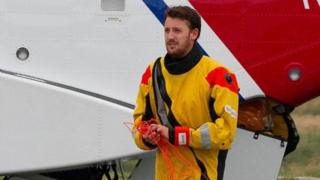Shetland Super Puma crash: Escape training 'saved my life'
 Image copyright
Shetland News
Image copyright
Shetland News
One of the survivors of a helicopter crash off Shetland which left four people dead has said simulation training saved his life.
Sarah Darnley, 45, from Elgin, Duncan Munro, 46, from Bishop Auckland, and George Allison, 57, from Winchester, drowned after the crash in 2013.
Gary McCrossan, 59, from Inverness, died from heart failure.
Matthew Bower told the second day of an inquiry he got out the upturned, submerged aircraft in about 10 seconds.
The fatal accident inquiry also heard that one of the survivors, Samuel Bull, later took his own life in 2017 after suffering from post-traumatic stress disorder (PTSD).
Fifth victim
Derek Pyle, Sheriff Principal of Grampian, Highland and Islands, said: "It's important to record that there was another victim apart from the four who died on the day.
"His death was plainly directly caused by the accident".
The four passengers who died were among 18 people who were on board the Super Puma when it crashed.
Mr Bower, 31, told the inquiry he was sitting directly behind the pilots, facing towards the rear of the helicopter.
He said he had fallen asleep, but when he woke he saw Sarah Darnley diagonally from him looking "particularly panicked".
Mr Bower said: "It was quite clear she was worried about something."
He said the sea out the window was "significantly closer than expected" and then it was clear they were falling.
'Instinctual brace position'
He said the sea was coming towards them too quickly, and it felt as if the helicopter lurched to one side, and they hit the water at an angle and it instantly went over.
Mr Bower said going into the brace position was "instinctual".
He said the helicopter was instantly filling with water. "This is when your training kicked in," he recalled.
Upside down, he knocked his window out, opened his buckle, and swam to the surface.
He said from reacting and getting to the surface was probably only 10 seconds.
"There was a lot of shock", he said.
Mr Bower said he then helped with chest compressions on Gary McCrossan in a life raft as they tried to save him, until help arrived.
Mr Bower said everyone had to undergo safety training for working offshore.
Pool training simulation included several runs including leading up to escaping from a complete invert, he said.
Asked by Martin Richardson for the Crown if it was helpful, chemist Mr Bower said: "It saved my life on that day."
The first day of the inquiry had heard that the helicopter's pilots did not notice their reducing airspeed until it was too late.
The inquiry heard the commanding pilot, Martin Miglans, said he would never fly again due to the trauma.
There was no evidence found of fault with the helicopter that caused or contributed to the crash.
The inquiry, which was previously delayed due to coronavirus measures, continues.